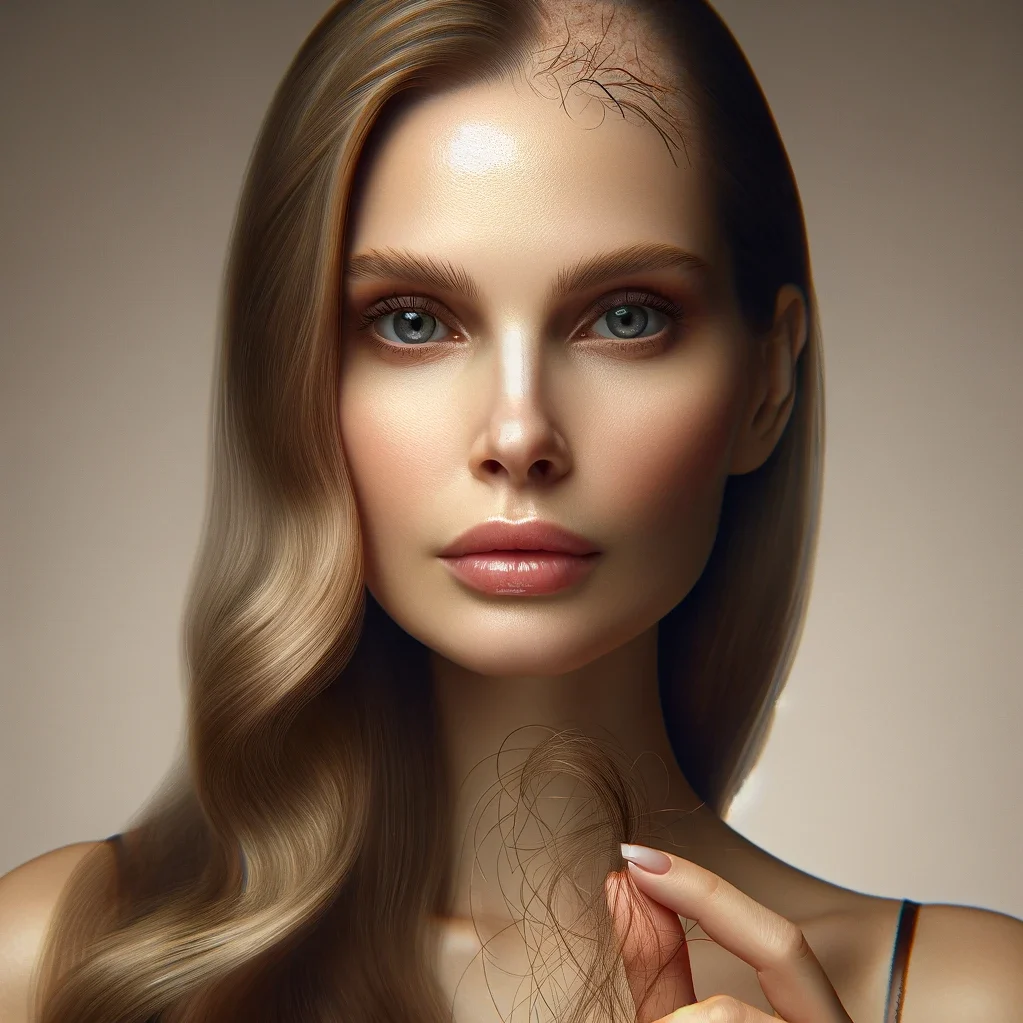Exposure to the high heat from the sun can indeed contribute to accelerated hair thinning. According to dermatologist Wilma Bergfeld, MD, sun damage can lead to various issues with the hair, including discoloration, dryness, brittleness, split ends, thinning, and frizziness. Prolonged exposure to UVA and UVB rays can damage the cuticle, the outer layer of the hair strand, causing it to become dry, brittle, and frizzy. Sun damage can also change the hair’s color and even lead to premature graying. Fine or light-colored hair is particularly vulnerable to sun damage, while darker or coarser hair provides more natural protection.
It’s important to take steps to protect the hair from the sun, such as using hair sunscreen with UV filters like avobenzone, octinoxate, and zinc oxide. Hair sunscreen works by creating a protective barrier on the hair’s surface, shielding it from the damaging effects of UV rays. Additionally, it’s essential to protect the scalp from the sun’s rays by using regular sunscreen or specific scalp protection products.
Key Takeaways:
- High heat from the sun can contribute to accelerated hair thinning
- Prolonged sun exposure can lead to dryness, brittleness, and frizziness in the hair
- Fine or light-colored hair is more vulnerable to sun damage
- Using hair sunscreen and protecting the scalp are important preventive measures
- Taking steps to protect the hair from the damaging effects of UV rays is crucial for maintaining hair health
The Connection Between Weather and Hair Loss
While weather conditions, including sun exposure and heat, are not directly responsible for hair loss, there is a connection between certain weather conditions and hair health.
Cold weather, for example, can lead to hair loss due to factors such as wearing tight-fitting hats that pull on the hair and cause traction alopecia. Additionally, cold temperatures can lead to a dry scalp, making the hair more brittle and prone to breakage.
On the other hand, hot weather can cause hair to become thinner. During prolonged exposure to heat, hair shedding increases in the telogen phase, leading to temporary hair thinning. The heat can also dry out the hair, making it more fragile and prone to breakage.
Regardless of the weather, it’s important to take care of your hair by keeping it moisturized and using appropriate products. In cold weather, consider using a moisturizing shampoo to combat dryness. In hot weather, conditioning shampoos can help retain moisture and prevent excessive dryness.
To minimize damage and breakage, it’s crucial to protect your hair from excessive heat and sun exposure. This can be achieved by using hair sunscreen or wearing a hat when exposed to the sun for prolonged periods.
In conclusion, while weather conditions do not directly cause hair loss, they can impact the health of your hair. By understanding the connection between weather and hair health, you can take the necessary steps to protect and maintain the quality of your hair.
Maintaining Hair Health in Different Climates
Different climates can have an impact on the health of your hair. While they do not directly affect the rate of hair growth, they can influence its overall condition. In cold weather, the dry air can lead to hair dryness and brittleness. This lack of moisture can cause breakage, split ends, and an increase in static electricity buildup. To combat these issues, it’s important to use moisturizing shampoos and hair products that can help retain moisture and maintain hair health during cold weather.
Similarly, in warm weather, high temperatures can also have a drying effect on the hair, making it prone to dryness and brittleness. Using conditioning shampoos and products can help retain moisture and keep your hair hydrated. High humidity can also pose challenges to different hair types. Excess moisture can make fine hair become heavy and lose volume, while curly or wavy hair may become frizzy.
It’s important to note that ultraviolet (UV) radiation from the sun can damage the hair as well. Prolonged exposure to the sun can cause the hair to lighten, become brittle, and experience protein breakdown. To protect your hair from these damaging effects, it’s crucial to take proper hair care precautions. This includes using shampoos and hair products that are specifically suited to different climates and providing protection from extreme temperatures and UV light.
By adopting a hair care routine that takes into account the specific climate you are in, you can help maintain the health and vitality of your hair all year round.
FAQ
Does exposure to the high heat from the sun contribute to accelerated hair thinning?
Yes, exposure to the high heat from the sun can contribute to accelerated hair thinning. Prolonged exposure to UVA and UVB rays can damage the cuticle, leading to dryness, brittleness, split ends, thinning, and frizziness.
Is there a link between sun exposure and hair loss?
While weather conditions, including sun exposure and heat, are not directly responsible for hair loss, there is a connection between certain weather conditions and hair health. Sun damage can lead to various issues with the hair, such as discoloration, dryness, brittleness, thinning, and frizziness.
How can I protect my hair from sun exposure and heat?
To protect your hair from sun exposure and heat, you can use hair sunscreen with UV filters like avobenzone, octinoxate, and zinc oxide. These sunscreens create a protective barrier on the hair’s surface. It’s also important to protect the scalp from the sun’s rays by using regular sunscreen or specific scalp protection products.
Does sun heat lead to hair loss?
Sun heat itself does not directly lead to hair loss. However, prolonged exposure to high heat can contribute to hair thinning by increasing shedding during the telogen phase and causing dryness and brittleness. It’s essential to protect the hair from excessive heat and sun exposure to minimize damage and breakage.
How does cold weather affect hair health?
Cold weather can lead to hair loss due to factors such as wearing tight-fitting hats that pull on the hair and cause traction alopecia. Additionally, cold temperatures can lead to a dry scalp and make the hair more brittle and prone to breakage.
How does hot weather affect hair health?
Hot weather can cause hair to become thinner due to increased shedding during the telogen phase. The heat can also make the hair dry out and become brittle. It’s important to moisturize the hair and protect it from excessive heat and sun exposure.
Do different climates affect hair growth?
Different climates do not impact the rate at which hair grows, as hair growth is mainly determined by genetics. However, cold weather can lead to dryness and brittleness, while high temperatures can also cause dryness and brittleness. High humidity can affect hair by making it heavy or frizzy.
How can I maintain hair health in different climates?
To maintain hair health in different climates, it’s important to use appropriate hair products suited for the specific weather conditions. For cold weather, moisturizing shampoos can combat dryness, while conditioning shampoos are essential to retain moisture in hot weather. It’s also crucial to protect the hair from extreme temperatures and UV light.

